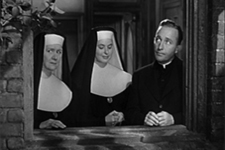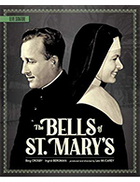The Bells of St. Mary's
|  Even though sequels were fairly rare during the classical studio era outside of low-budget serials like Flash Gordon and occasional feature film series like The Thin Man, hindsight shows that it was a literal no-brainer that Leo McCarey would follow his Oscar-winning smash hit Going My Way (1944) with a sequel, The Bells of St. Mary’s, just a year later. Going My Way, which featured Bing Crosby and Barry Fitzgerald as Catholic priests trying to hold together their faltering New York City parish, was a unique production in that McCarey was an independent filmmaker; unlike most directors in the 1940s, he was not tied to a contract with any particular studio. He brought his idea for Going My Way, which he co-wrote, produced, and directed, to Paramount, which saw the film as a potential vehicle for Crosby. McCarey waived his director’s fee in lieu of profit-sharing and wound up taking home a big paycheck since Going My Way topped the box office charts in 1944 and won seven Oscars (including Best Picture, Best Actor and Supporting Actor for Crosby and Fitzgerald, and Best Director and Best Writing for McCarey). So, as I said, the fact that McCarey would want to keep that momentum going should come as no surprise, and a year later he churned out The Bells of St. Mary’s, which topped the box office charts in 1945 (it made even more money than its predecessor), kept Bing Crosby atop the Exhibitors’ Poll favorite actor ranking, and racked up eight Oscar nominations (although it only won one for Best Sound; Billy Wilder’s The Lost Weekend was the big winner that year). McCarey shrewdly switched studios, taking the project to RKO instead of Paramount; Crosby, who had quasi-independent status, was able to leave Paramount to reprise his Oscar-winning role of Father Chuck O’Malley, and David O. Selznick loaned out Ingrid Bergman to star as Sister Mary Benedict. Bergman was then at the height of her Hollywood stardom (she had won her first of three Oscars for 1944’s Gaslight) and it was just a few years before her scandalous affair with Italian director Roberto Rossellini. The screenplay by the prolific Dudley Nichols (The Informer, Stagecoach) from a story by McCarey recreates much of what was popular in Going My Way, particularly the balance of interpersonal issues as the parish leaders work with the troubled kids in their school and economic issues involving the parish itself being in danger of closing. In this case, the titular parochial school of St. Mary’s, headed by Sister Mary Benedict, is in dire physical condition, and she and the other sisters are prayerfully eyeing the new building being constructed next door by Horace P. Bogardus (Henry Travers), a curmudgeonly businessman who wants to buy out the school to build a parking lot. The flow of the story feels more like a collection of related vignettes rather than a cohesive narrative, with each bit reaffirming the fundamental decency of the characters involved and how a little love, caring, and kind words can ultimately carry the day. The subplot involving Mr. Bogardus and his building is given the most attention, but there are also stories about Sister Mary Benedict helping a young boy (Dickie Tyler) learning to stand up for himself with a little guidance from Father O’Malley (who, having spent time out in the world, isn’t above recommending some fisticuffs when push comes to shove) and Father O’Malley’s work in bringing together the estranged parents (Ruth Donnelly and William Gargan) of a new student named Patsy (Joan Carroll). Given the massive popularity of both Going My Way and The Bells of St. Mary’s, it is not surprising that they have both persisted as regular favorites, their sentimental values and easy-going tone making them like smooth butter for aficionados of reassuring entertainment. McCarey was a versatile artist with a handful of outright masterpieces, including the Marx Brothers’ farce Duck Soup (1933), the heart-breaking end-of-life drama Make Way for Tomorrow (1937) (a film that Orson Welles once said could make a stone cry), and The Awful Truth (1937), an Irene Dunne-Cary Grant romantic comedy about divorce. In his book The American Cinema, a cataloging of American directors from the 1920s through the ’60s, Andrew Sarris categorized McCarey alongside Frank Capra, Cecil B. DeMille, Vincente Minnelli, Nicholas Ray, and Preston Sturges in the “Far Side of Heaven,” which was second only to “Pantheon Directors.” Sarris noted that McCarey “distilled a unique blend of farce and sentimentality,” and he was best known not for his “rigorous direction,” but rather “his relaxed digressions.” One can see that very much at work in The Bells of St. Mary’s, which seems to float along on its own path, never hurried, but not too lackadaisical, either. It feels a bit flat at times, and one wonders if McCarey’s desire to rush out a sequel to his previous hit didn’t compromise the film to some extent. Both Crosby and Bergman are appropriately wonderful in their respective roles, and Crosby gets to croon a few tunes, which was to be expected. One can see why those who love the film love it to this day and have such warm memories of it, although those approaching it for the first time may wonder what all the fuss is about.
Copyright © 2019 James Kendrick Thoughts? E-mail James Kendrick All images copyright © Olive Films | |||||||||||||||||||||||||||||||
Overall Rating: 

 (2.5)
(2.5)


